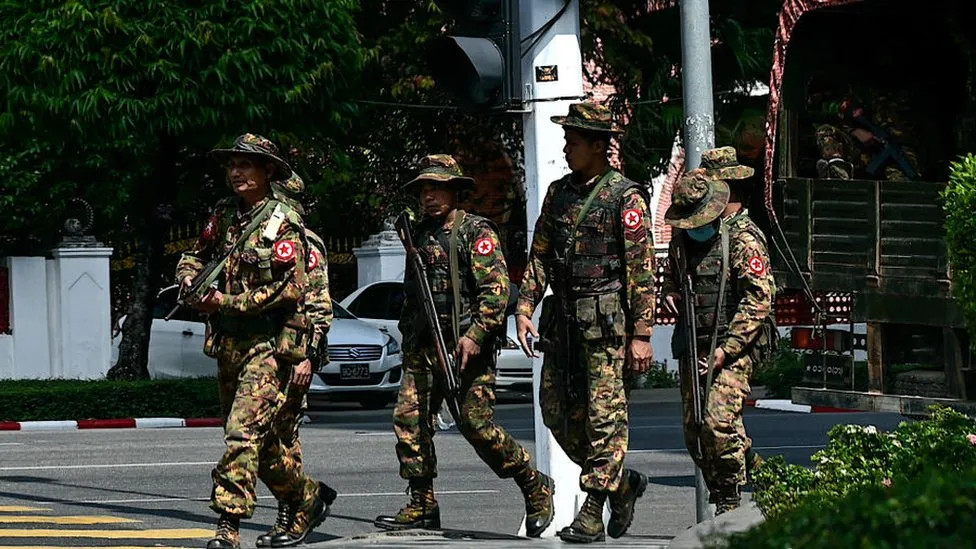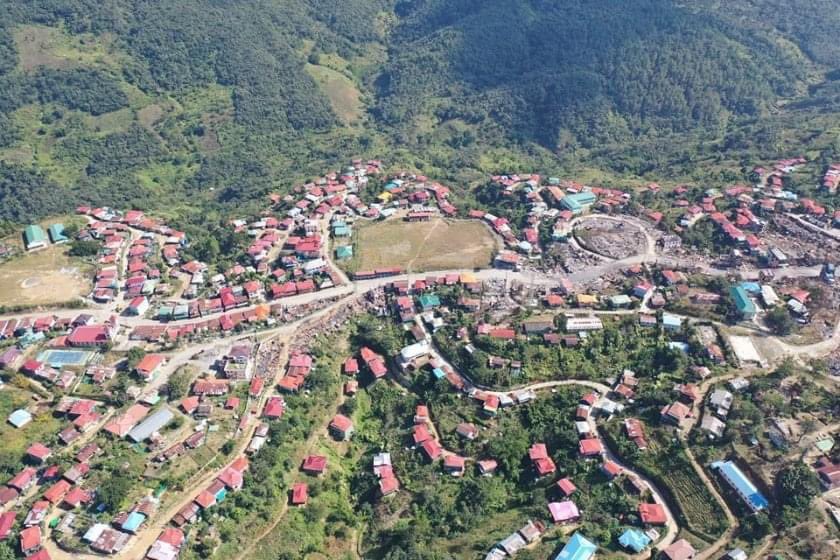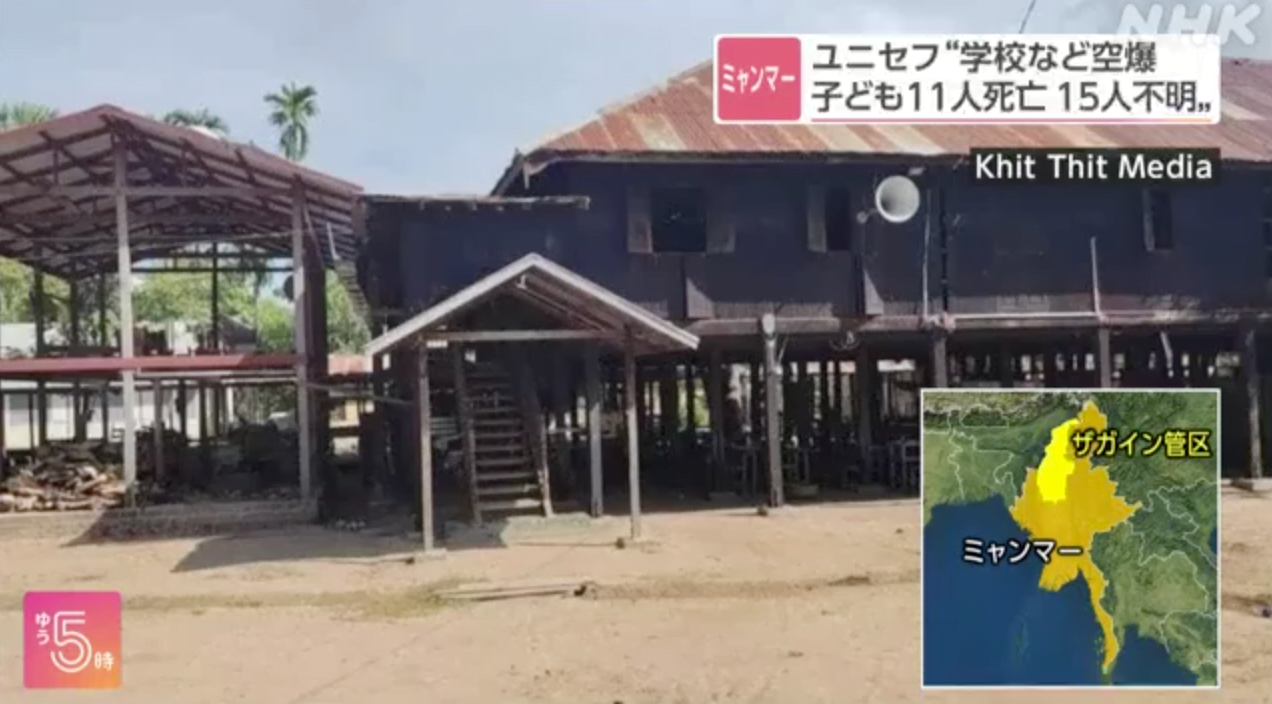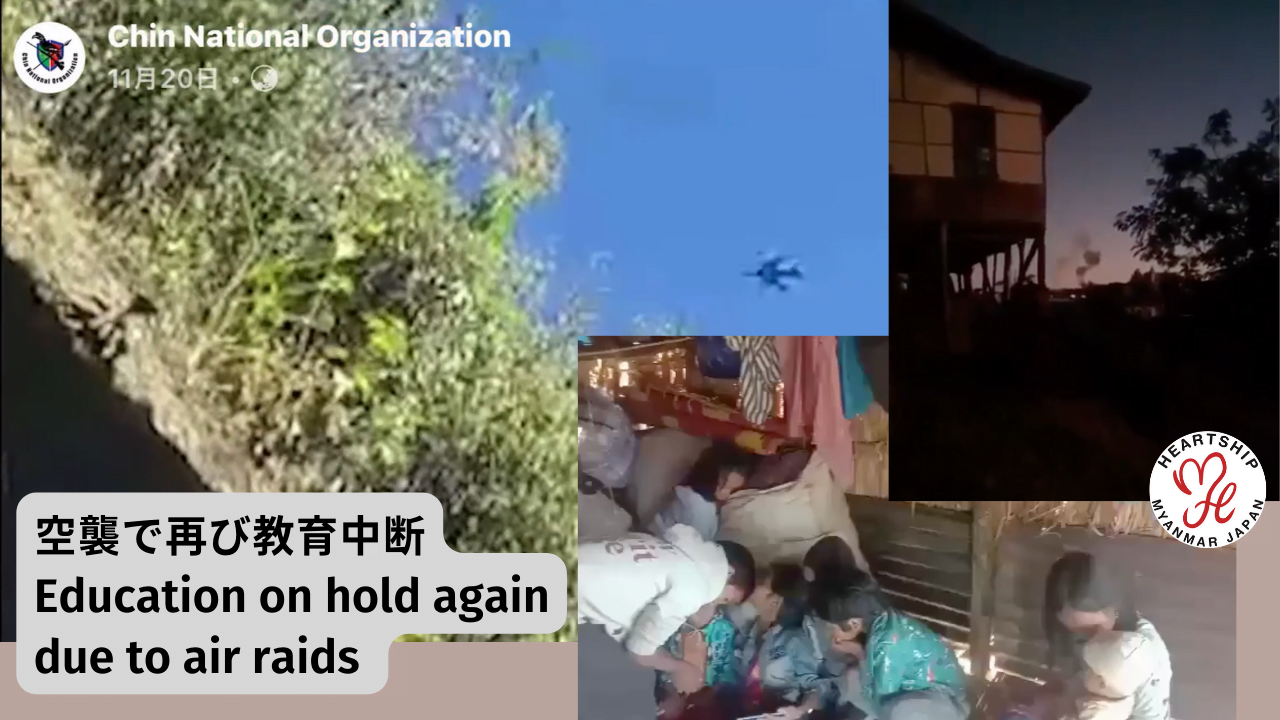Recently, Myanmar’s ruling junta announced that all men aged 18 to 35 and women aged 18 to 27 must serve in the military for up to two years. This is an article by the Australian ABC News.
つい最近、ミャンマーの政権与党は、18歳から35歳までの男性と18歳から27歳までの女性は、最長2年間兵役に就かなければならないと発表しました。これは何を意味するのか。オーストラリアABC Newsの記事を紹介します。
By Will Jackson ウィル・ジャクソン
The Myanmar junta’s decision to begin enforcing a conscription law first enacted 14 years ago is an attack on the country’s young people, a “pronouncement of psychotic resolve” and likely to have unintended consequences, analysts say.
14年前に制定された徴兵法の執行を開始するというミャンマー政府の決定は、同国の若者に対する攻撃であり、「異常な決定」であり、意図しない結果をもたらす可能性が高いとアナリストは指摘する。
The junta’s State Administrative Council (SAC) made the announcement via state media on Saturday.
All men aged 18 to 35 and women aged 18 to 27 must serve for up to two years, while specialists like doctors aged up to 45 must serve for three years.
The service could be extended to a total of five years in the ongoing state of emergency.
国家行政評議会(SAC)は土曜日に国営メディアを通じて発表した。
18歳から35歳までの男性と18歳から27歳までの女性は2年まで、45歳までの医師などの専門家は3年まで服務しなければならない。
非常事態が続くなか、任期は5年まで延長される可能性がある。
ミャンマー軍事政権のスポークスマン、ゾー・ミン・トゥン(Reuters)
“The duty to safeguard and defend the nation extends beyond just the soldiers but to all citizens,” junta spokesman Zaw Min Tun said.
“So I want to tell everyone to proudly follow this people’s military service law.”
Those who fail to comply with the draft face up to five years in prison, the legislation says.
軍事政権のスポークスマン、ゾー・ミン・トゥンは言う。「国家を守り抜く義務は、兵士だけでなく、すべての国民に及ぶ。だから私は、この人民兵役法に誇りを持って従うよう、すべての人に言いたい。」
徴兵に従わない者は5年以下の懲役に処される、と法律では定められている。
“If they force me, I will just run away”
A 31-year-old doctor in Myanmar’s largest city, Yangon, told Reuters he would rather leave Myanmar than serve in the military.
“I cannot continue to live in the country because they can come get us anytime,” he said.
“If they force me, I will just run away. There’s no way I am going to sacrifice my life for them,” said the doctor, who asked not to be named for security reasons.
「強要されたら、逃げるだけ」
ミャンマー最大の都市ヤンゴンに住む31歳の医師は、兵役に就くくらいならミャンマーを出たいとロイターに語った。
「このまま暮らすわけにはいきません。いつでも私たちを捕まえに来るかもしれないので。もし強制されたら、逃げるだけです。彼らのために自分の命を犠牲にすることはあり得ません」と、安全上の理由から名前を伏せて医師は語った。
A 31-year-old banker said she feared the junta would classify her as a “specialist” and force her to serve.
“Instead of serving them, I will either leave the country or probably join the revolution forces,” she said, also declining to be identified.
ある31歳の銀行員は、政権が自分を “専門家 “に分類し、兵役を強制することを恐れていると語った。
「彼らに奉仕するくらいなら、国を出るか、革命軍に参加します」と、彼女はまた、身元を明かすことを拒否して言った。
Military junta ‘on the back foot’
Myanmar has been gripped by chaos since the military seized power from the country’s elected government in the 2021 coup.
後手に回る軍事政権
2021年のクーデターで軍が選挙で選ばれた政府から政権を奪取して以来、ミャンマーは混乱に陥っている。
In October, an alliance of three ethnic-minority insurgent groups with pro-democracy fighters launched a coordinated offensive in northern Shan State which culminated in the junta ceding control of the Kokang region in exchange for a localised ceasefire.
10月には、3つの少数民族の反政府武装勢力と民主化派の戦闘員の連合がシャン州北部で協調攻勢を開始し、軍事政権は局地的な停戦と引き換えにKokang地域の支配権を譲るに至った。
Since then the military has continued to suffer a series of stinging defeats by other ethnic armed groups and anti-junta forces elsewhere in the country.
それ以来、軍部は国内の他の場所で、他の民族武装グループや反ジュンタ勢力による痛烈な敗北を続けている。
1962年に旧英国植民地に初めて政権を奪取して以来、軍は最大の窮地にいる。
It is the biggest challenge the military has faced since first taking power in the former British colony in 1962.
Richard Horsey, a political analyst and Myanmar adviser to the Crisis Group, said the army was “on the back foot” in many parts of the country.
“It has suffered historic losses in Shan State over the last three months, and something similar is now playing out in Rakhine State,” he said.
He said morale among officers was low, units were overstretched and they faced determined opponents who felt they had momentum.
While the junta still had a large number of troops, its fighting strength was ebbing, he said.
“The army has a lot of soldiers, but many are required for fixed deployments to defend critical locations and infrastructure,” he said.
“What the army lacks is enough experienced, rapidly deployable mobile forces — which are needed to reinforce units under attack, or to mount counteroffensives.”
クライシス・グループの政治アナリストでミャンマー・アドバイザーのリチャード・ホーシー氏は、軍は国内の多くの地域で「後手に回っている」と述べた。
「この3ヶ月間、シャン州では歴史的な損失を被った。将校の士気は低く、部隊は手薄になり、勢いを感じている敵対勢力に直面している。軍にはまだ多くの兵士がいるが、その戦闘力は衰えつつある。多くの兵士が重要な場所やインフラを守るために固定配置されている。攻撃を受けている部隊を増援したり、反撃に転じたりするために必要な、経験豊富で迅速に展開できる機動部隊は、今の軍にはない。」
Why a 14-year-old law is being enforced only now
The law mandating conscription was first introduced in 2010 but has not been enforced.
14年前の法律が今になって施行された理由
徴兵制を義務付ける法律は2010年に初めて導入されたが、施行されていない。
Independent Myanmar analyst David Mathieson said its use now was clear evidence the military regime was facing a serious personnel shortage.
“The conscription law was always one of those military insurance policies established before the 2010 election and the beginning of the so-called ‘transition’,” he said, in reference to the partial and temporary democratisation of the country.
“But it wasn’t required as recruitment levels for officers and ranks appeared to be stable [and] sufficient to make up for conflict casualties.
独立系ミャンマー人アナリストのデービッド・マティーソン氏は、現在徴兵法が使われているのは、軍事政権が深刻な人材不足に直面している明らかな証拠だと述べた。
徴兵法は、2010年の選挙といわゆる “移行 “が始まる前に確立された軍の保険政策のひとつだった。
「しかし、将校や階級の採用レベルが安定しており、紛争による死傷者を補うに十分であったため、その必要はなかったのです。」
“The regime deep down realises it’s in terminal decline and has dwindling public support even from its base: the wider Myanmar population have despised the army since the coup and the extreme brutality inflicted on civilians. There won’t be a long line for volunteers to prop up a fundamentally illegitimate junta, so they’re resorting to press-ganging the hapless into the ranks.”
「政権が衰退の一途をたどっていることを軍側も内心では認識しており、政権基盤からの支持さえも低下している。クーデター以来、多くのミャンマー国民は軍を軽蔑しており、民間人に加えられた極端な残虐行為もある。根本的に非合法な政権を支えるために、兵役志願者が長蛇の列を作ることはないでしょう。もはや、人々を無理やり徴兵に取るしかないのです。」
Mr Horsey said the military was now facing a high attrition rate from battlefield casualties, surrenders and desertions while at the same time struggling with recruitment.
“Most people simply don’t want to fight for the regime, even more so when it appears to be losing,” he said.
ホーシー氏によれば、軍は現在、戦場での死傷者、投降、脱走による高い消耗率に直面しており、同時に兵士の確保にも苦慮しているという。
「政権のために戦いたくないと感じている国民が多い。負ける気配がしている今は特にそうです。」
Conscription not just about boosting troop numbers
Justine Chambers, a Myanmar researcher with the Danish Institute for International Studies, said the junta’s decision to enforce the conscription law now was also a way to remove the young people who were spearheading the revolution from the civilian population and put them in positions where they were likely to be killed.
兵力増強だけが徴兵ではない
デンマーク国際問題研究所(Danish Institute for International Studies)のミャンマー研究者、ジャスティン・チェンバース氏は、ミャンマー政府が今、徴兵法を施行するという決定を下したのは、革命の先頭に立つ若者を民間人から排除し、殺される可能性の高い立場に置くためでもあると述べた。
The conscripts would probably be given minimal training before being sent to the front lines to be used primarily as human shields and porters as the military government had done in the past, she said.
“It’s about destroying them, destroying their lives, sending them to the front lines and turning them against each other,” she said.
“In the next year, we’re going to see huge loss of life among people who don’t support the military who aren’t soldiers.”
軍事政権が過去にしてきたように、徴兵された若者は、前線に送られる前に最低限の訓練を受け、主に人間の盾やポーターとして使われることになるだろう、と彼女は言う。
「彼らを破壊し、生活を破壊し、前線に送り込み、互いに敵対させるのです。今後1年、軍を支持せず、兵士でもない人々の間で莫大な犠牲が出るでしょう。」
Dr Chambers said the announcement had already struck fear into the hearts of the country’s youth who were terrified of being forced into the military to fight against their people.
“I have a lot of friends in this age category who are completely panicked,” Dr Chambers said.
“The couple of people I have spoken to have said they haven’t been able to sleep.
“Young people aren’t going to know when they’re going to get called up for the military; is it going to be this week or in six months?”
チェンバース博士によれば、この発表はすでに、国民と戦うために軍に強制連行されることを恐れているこの国の若者たちの心を恐怖に陥れているという。
「この年代の友人には、完全にパニックになっている人がたくさんいます。私が話した何人かは、眠れないと言っていました。若い人たちは、いつ軍隊に召集されるかわからないのです。それは6ヶ月後かもしれないし、来週かもしれない。」
Dr Chambers called on the Australian government and international community to condemn the move.
“But we need to more than just condemn it,” she said.
“There needs to be stronger action, I think.”
チェンバーズ博士は、オーストラリア政府と国際社会に対し、この動きを非難するよう呼びかけた。
「ただ非難するだけではなく、より強い行動が必要だと思います」。
Unintended consequences
Mr Mathieson said the Myanmar army had the capability to enforce the new law.
“But the two wildcard factors are operational dependability and broader social backlash,” he said. Even if they can forcibly recruit tens of thousands of men and gave them uniforms and weapons, how can they guarantee they will all fight effectively and not turn the weapons on the ‘loyal’ military?
“And how will civilians who may despise the military but have not supported active armed resistance feel when their young people, and likely civilians of all ages, are essentially enslaved for military service?”
意図せざる結果
マティーソン氏は、ミャンマー軍には新法を執行する能力があると述べた。
「しかし、ワイルドカードとなる2つの要因は、作戦の信頼性と、より広範な社会的反発です。何万人もの兵士を強制的に集め、軍服と武器を与えたとしても、彼らが全員効果的に戦い、『忠実な』軍隊に武器を向けないことをどうやって保証できるのか?
「そして、軍隊を軽蔑していても、これまで積極的な武装抵抗を支持していない若者や、あらゆる年齢の民間人は、奴隷のように兵役につかされとき、どのように感じるのだろうか?」
Mr Horsey said any conscription system was “likely to be very messy and have unintended consequences”.
“It will provide legal cover for abusive forced recruitment practices — grabbing poor young men, including minors, from bus stops in the cities, for example,” Mr Horsey said.
“It will open up a lot of corruption opportunities for those administering the system.
“If implemented at scale, it could drive higher levels of unregulated and risky labour migration.
“It may also push more people to join the armed resistance.
“It will also further erode morale in the army’s ranks — although this is not a fighting force that has ever really relied on high morale among foot soldiers.”
ホーシー氏は、徴兵制度は「非常に厄介で、意図しない結果をもたらす可能性が高い」と述べた。
「例えば、都市部のバス停で未成年者を含む貧しい若者を拉致するような、虐待的な強制徴用の法的な隠れ蓑になる。
制度を管理する側にとっては、多くの汚職の機会が開かれることになる。
この制度が大規模に実施されれば、規制のないリスクの高い労働移民が増える可能性がある。
また、より多くの人々が武装勢力に加わることになるかもしれない。
軍隊の士気もさらに低下するだろう。これまで、歩兵の士気の高さに頼ってきたわけではないとはいえ。」
Junta in ‘terminal decline’
Mr Mathieson said that while the military still had overwhelming firepower it was losing personnel on the ground “where it counts”.
“As a strategy to cling onto power, the SAC is evidently relying on air strikes and artillery to punish armed groups and target civilians to demoralise them, and likely planning on replenishing ground troops with forced conscription,” he said.
衰退の一途をたどる政権
マティーソン氏は、軍にはまだ圧倒的な火力がある一方で、「重要な場所」での人員は失われつつあると述べた。
「権力にしがみつくための戦略として、SACは武装グループを懲らしめ、市民の士気を下げるために空爆や砲撃に頼っていることは明らかであり、強制徴兵で地上部隊を補充することを計画している可能性が高い」と述べた。
He said the military was taking a beating but still had a significant network of personnel, bases, and equipment and the “asymmetric trump card” of air power, which meant a consolidation of power in the country’s heartland could be their strategy to hold on.
軍は打撃を受けているが、まだ人員、基地、装備の重要なネットワークがあり、空軍力という「非対称の切り札」がある、とマティーソン氏は続ける。
“In the long run it won’t work, I do think they’re in terminal decline, but it could indicate that the protracted endgame of the SAC could be even more bloody, brutal and destructive than it already is,” he said.
「長期的にはうまくいかないだろうし、彼らは末期的な衰退に陥っているとは思うが、SACの長期にわたる終盤戦は、今以上に血なまぐさく、残忍で破壊的なものになるかもしれない。
“I think this conscription law announcement shouldn’t be seen as a cry of desperation, but a pronouncement of psychotic resolve to take the entire country down with them.
「この徴兵法の発表は、自暴自棄の叫びと見るべきではなく、国全体を道連れにするという精神病的な決意の表明と見るべきではないだろうか。
“This isn’t an indication of imminent collapse, but a clear warning that the conflict could consume the entire country.”
「これは崩壊の兆候ではなく、紛争が国全体を蝕みかねないという明確な警告なのだ」。
ABC/Reuters




